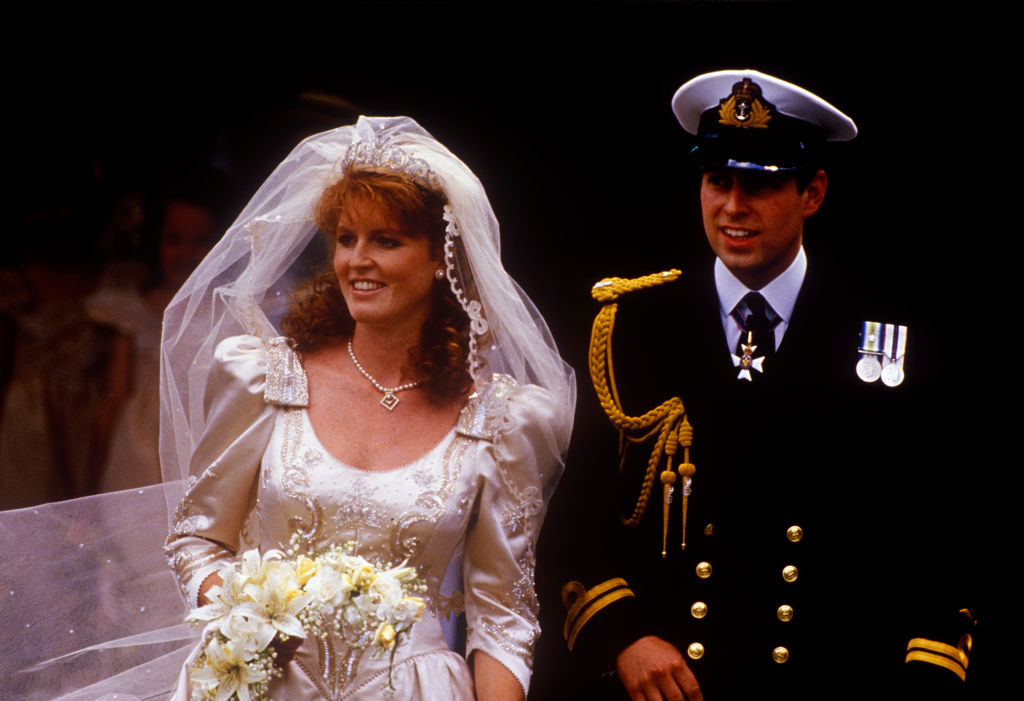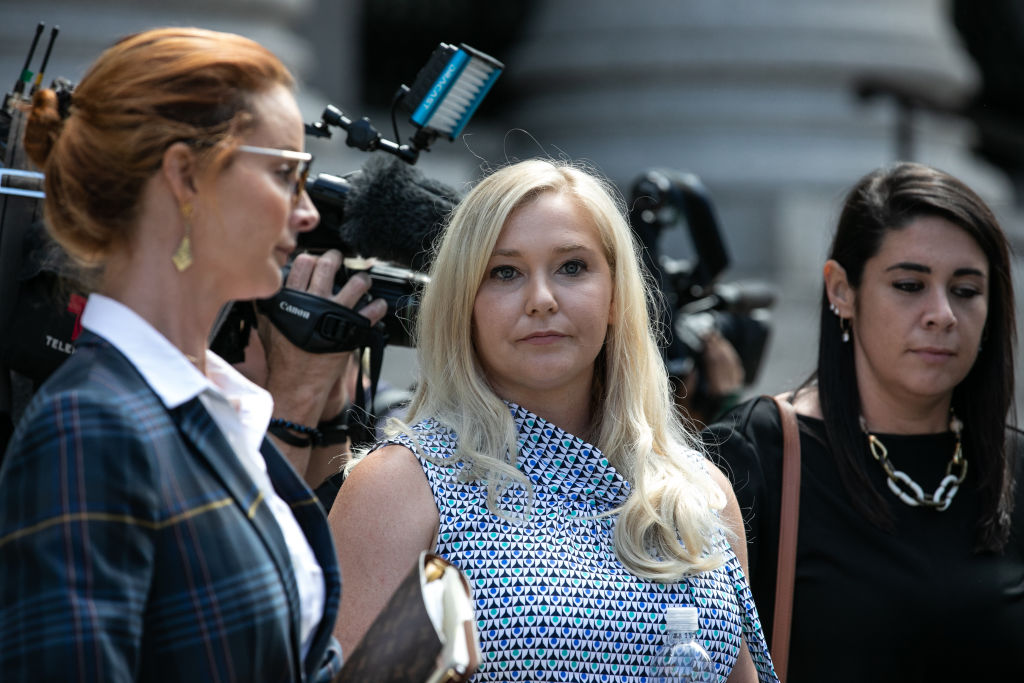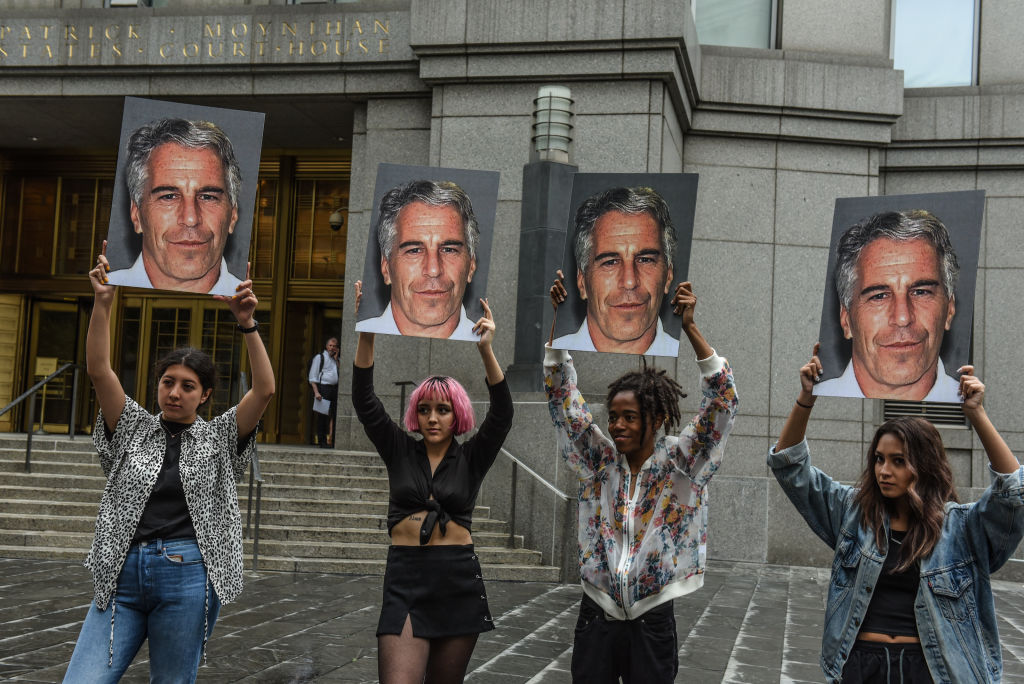Prince Andrew, said in his statement stepping back from public life that he is willing to help law enforcement in the investigation of Jeffrey Epstein “if required”—but lawyers for the convicted sex offender’s accusers remain unconvinced that the Duke of York is serious about being questioned by investigators.
Andrew announced in a statement on Wednesday that he is retreating from his royal public duties “for the foreseeable future” amid a controversy surrounding his relationship with the disgraced American financier, who died in an apparent suicide in a New York City federal jail in August. The Prince said in the statement that he is “willing to help any appropriate law enforcement agency with their investigations, if required.”
Attorney Gloria Allred, who is representing several of Epstein’s alleged victims, told the BBC that she was “glad” that the prince appeared to signal he was open to cooperating with authorities but expressed confusion about what he would do now. “Is he insisting that he be served with a subpoena to testify, or is he willing to speak to law enforcement without being legally required to do so?” she asked on the BBC. In a statement to TIME, Allred added, “My clients who are victims of Jeffrey Epstein have spoken to law enforcement without being ‘required’ to do so.”
Andrew also expressed regret over his association with Epstein and sympathy for Epstein’s alleged victims in the statement. He added that the “circumstances relating to (his) former association” with Epstein had “become a major disruption” to the royal family’s work and the charities he supports.
In an exclusive televised interview with the BBC at Buckingham Palace broadcast in the U.K. Saturday, Queen Elizabeth’s son was questioned about his relationship with Epstein and allegations made by a woman who said he had sex with her when she was 17. Epstein died in an apparent suicide in a New York City federal jail in August.
During last week’s BBC Interview Andrew had said that he didn’t regret his entire relationship with Epstein, instead noting that the people he met and opportunities he got because of Epstein were “actually very useful.”
Although it is not the first time that Andrew, who currently stands eighth in line to the British throne, has faced controversy, it is undoubtedly the most serious. Here’s what to know about the Duke of York, his past controversies and his links with Epstein.
Who is Prince Andrew’s family?
Now 59 years old, Prince Andrew is the third child and second son of Queen Elizabeth and Prince Philip. In 1986, he married Sarah Ferguson, who came from a well-connected family and was initially well liked by the press and public for her fun and outgoing character. The pair had two daughters, Princess Beatrice in 1988 and Princess Eugenie in 1990, before their divorce in 1996.
Public opinion began to turn against Ferguson after a series of incidents, including an undercover sting in which she was caught on camera offering access to Prince Andrew in return for £500,000 in 2010. In 2011, it was revealed that Ferguson had accepted $15,000 from Epstein in order to pay off her debts. The duchess has tweeted in support of her ex-husband, saying “Andrew is a true and real gentleman and is stoically steadfast to not only his duty but also his kindness and goodness.”

As is traditional for many male members of the Royal Family, Andrew has had a successful military career, joining the Royal Navy in 1979. He was also a pilot in the Falklands War, where he took part in missions in the conflict from April until September 1982; an experience he raised in his interview with the BBC. Since 2015, he has held the rank of Vice Admiral.
Andrew is also a chancellor at the University of Huddersfield. On Monday, a panel from the university’s student union voted unanimously to lobby the Duke to resign his post at the university. Andrew is also actively involved with or the patron of several charities and trusts. Several partners of his charitable activities are now reconsidering their ties. Buckingham Palace confirmed that accounting firm KPMG is not renewing its sponsorship of the Duke’s entrepreneurial scheme Pitch@Palace, according to the Guardian. Pharmaceutical company AstraZeneca also told British media outlets that it was reviewing its involvement in the scheme.
Has Prince Andrew been involved in any previous controversies?
Prince Andrew is no stranger to controversy. His judgment has come under scrutiny several times, including his past meetings with Libyan dictator Muammar Gaddafi’s son Saif; his connection to Timur Kulibayev, the son-in-law of the then-president of Kazakhstan who purchased one of Andrew’s properties for £3 million more than its asking price; and his hosting of the son-in-law of Tunisia’s ousted president, Zine al-Abidine Ben Ali at Buckingham Palace.
In 2011, Andrew stood down as Britain’s “special representative” for trade and investment, amid increasing criticism of his relationship with Jeffrey Epstein. He had held the post since 2001, with the purpose to promote U.K. trade interests abroad. The numerous foreign trips that Andrew took as part of this role, including trips to the U.S. where he had interacted with Epstein, were heavily criticized for their cost, earning him the moniker “Air Miles Andy.” During his interview with the BBC, Andrew attempted to dispel his reputation as a “Party Prince.” “I was single for quite a long time in the early 1980s, and after I got married I was happy. I’ve never felt the need to go and party,” he said. “Certainly going to Jeffrey’s was not about parties. Absolutely not.”
On Monday, further controversy surrounding the prince broke when a former political aide to ex-prime minister David Cameron alleged that Andrew had used the n— word in a 2012 conversation at Buckingham Palace. The London Evening Standard reported that unnamed palace sources denied that the incident took place. Separately, former Home Secretary Jacqui Smith said in a radio interview over the weekend that the Duke had made “unbelievable” offensive and racist comments about Arab people after attending a state banquet with members of the Saudi royal family in October 2007. The Evening Standard reported that a palace spokesman responded to the claims regarding Smith’s allegations by saying that the Duke “does not tolerate racism in any form.”
What are the allegations against Prince Andrew?
Virginia Giuffre (sometimes referred to as Virginia Roberts) has alleged that Epstein “made her” have sex with Andrew “several times.” Giuffre said she had sex with the prince, whom she said she called “Andy,” on three occasions that she detailed in an affidavit from a federal court filing in the Southern District of Florida—including at the London home of Epstein’s former girlfriend and longtime friend Ghislaine Maxwell and at Epstein’s New York City mansion when she was 17 in 2001.
A widely-circulated picture shows a smiling Andrew with his left arm around Giuffre’s waist. Giuffre alleged in court filings that it was taken at Maxwell’s London home shortly before the first time he had sex with her, according to her affidavit.
Maxwell, who was a British socialite for many years, has denied the allegations of wrongdoing.
Andrew has repeatedly denied Giuffre’s allegations, saying that they never engaged in any sexual activity and that he does not recall meeting her.
Andrew is just one of many wealthy and powerful men that Giuffre has said she had sex with at the behest of Epstein or Maxwell. All of her allegations have been denied.
Epstein’s death effectively ended his criminal prosecution but his alleged victims have called for prosecutors to continue investigating potential co-conspirators. Epstein had previously settled several civil lawsuits over alleged abuse.

How has Prince Andrew responded?
In response to Giuffre’s allegations, Andrew told the BBC interviewer, “I have no recollection of ever meeting this lady.” He said that on March 10, the day Giuffre said Andrew had sex with her, he had taken one of his children to a party at a popular pizza restaurant and stayed indoors with his children while he was on leave from the Royal Navy.
Part of Giuffre’s description of the night in question also described Prince Andrew as “profusely sweating” while they danced in a nightclub. Andrew responded by saying that it was “almost impossible for me to sweat” at the time due to suffering what he described as “an overdose of adrenaline in the Falklands War when I was shot at.”
Regarding a photograph of Giuffre and Andrew together that was provided by Giuffre to the press earlier this year, the Duke was unable to explain it and said that he had no memory of the photograph being taken. Andrew said that while it could not be determined whether the photograph was faked, he said that he did not believe the photograph was taken in London due to his choice of attire and said that “public displays of affection are not something that I do.”
Responding to Giuffre’s other allegations, Andrew denied having sex with her in New York at Epstein’s mansion and on Epstein’s private island. Andrew also denied being present in these locations at the times that Giuffre has alleged. “I’ve been through it and through it and through it over and over again, and nothing. It never happened,” said Andrew.
Andrew also said that until 2006 when an arrest warrant was issued against Epstein, he had no idea about allegations that Epstein was involved in alleged sex trafficking.
“At the time, there was no indication to me, or anybody else, that that was what he was doing. Certainly when I saw him in the U.S. or when I was staying in his houses in the U.S., there was absolutely no indication,” Andrew responded. When asked if he would be willing to testify under legal oath, Andrew said he would be duty bound to do so “in the right circumstances. There’s just as much closure for me as there is for everybody else.”
How are Prince Andrew and Jeffrey Epstein connected?
According to Andrew, he met Epstein in 1999 through Maxwell, whom he had known since she was a college student in the U.K. Andrew says that he saw Epstein about twice a year, and if Andrew was in the U.S. on a visit or trip as part of his role representing international trade, Epstein would offer up the use of his houses for him to stay in. Andrew also confirmed that he had traveled on Epstein’s private plane, visited Epstein’s private island and home in Palm Beach, Fla., and visited Maxwell’s house in London’s Belgravia neighborhood.
Andrew invited Maxwell and Epstein to a party hosted by Queen Elizabeth at Windsor Castle in June 2000, at a celebration commemorating four royal birthdays. The pair was also invited that same year to a shooting weekend at Sandringham House, one of the Queen’s country homes, reportedly to celebrate Maxwell’s birthday.
In May 2006, an arrest warrant was issued for Epstein for sexual assault of a minor; two months later in July, Epstein attended Andrew’s daughter Princess Beatrice’s 18th birthday party at Windsor Castle. During the BBC interview, Andrew said that he had invited Maxwell to this event, and that Epstein had come as her plus-one. Andrew also said that he was not aware of Epstein’s arrest warrant in the U.S. at the time the invitation for the party had been sent out.

What has Prince Andrew said about his friendship with Epstein?
“We were friends because of other people,” said Prince Andrew in the BBC interview, referring to Maxwell several times as the main reason for the connection between the two men. “It would be a considerable stretch to say that we were very, very close friends. But he had this extraordinary ability to bring extraordinary people together, and that’s the bit that I remember. Going to the dinner parties where you would meet academics, politicians, people from the United Nations. It was a cosmopolitan group of what I would describe as U.S. eminence.”
Giuffre has accused Maxwell of acting as Epstein’s “madame” and “co-conspirator” in court documents released earlier this year from a 2015 defamation lawsuit she brought against Maxwell. In those documents, Giuffre alleged that Maxwell was “one of the main women” whom Epstein used “to procure under-aged girls for sexual activities.”
Maxwell has denied Giuffre’s allegations in both public statements and legal filings.
Andrew said that he ceased contact with Epstein after he became aware Epstein was under investigation in 2006, and says he was not in touch with the banker until 2010. In December 2010, a few months after Epstein’s release from prison after 13 months, Andrew stayed with him at his house in New York. “I went there with the sole purpose of saying to him that because he had been convicted, it was inappropriate for us to be seen together,” said Andrew. He said that during this visit, he only saw Epstein for a dinner party, a walk in the park during which the two were photographed together and crossing paths in a corridor in the house.
Andrew said that it was during the walk in Central Park that the pair decided they would part company, and that from that day forward, they would not have any contact. Soon after those images surfaced, Giuffre gave an interview in which she alleged Andrew had sex with her.
When asked if he regretted that trip to New York, Andrew said that he did. When asked if he regretted the whole friendship with Epstein, Andrew replied: “Still not, because the people that I met and the opportunities I was given to learn, either by him or because of him, were actually very useful.” Andrew said his initial reaction on hearing of Epstein’s death earlier this year was one of shock.
How has Virginia Giuffre responded?
Giuffre said in her affidavit that Buckingham Palace’s denial that Andrew had any sexual contact with her is “false and hurtful.”
“Given what he knows and has seen, I was hoping that he would simply voluntarily tell the truth about everything,” she said, according to court documents.
Giuffre reiterated her position earlier this year when she said publicly about Andrew that “he knows exactly what he’s done and I hope he comes clean about it.”
Lawyers who have represented Giuffre did not respond to a request for comment on Monday.
What happens next?
The Duke’s interview has received fierce backlash from observers and commentators both in the U.K. and in the U.S., with one commentator calling it “not so much a car crash but an articulated lorry [semi-truck] crash.”
In the interview, Andrew said he will continue to work with his chosen charities. However, there have been calls for charities associated with the Duke to cut their ties with him.
Lawyers based in the U.S. representing Epstein’s victims have also strongly criticized the interview, with one calling for him to speak to the FBI about his involvement with Epstein.
More Must-Reads from TIME
- L.A. Fires Show Reality of 1.5°C of Warming
- Home Losses From L.A. Fires Hasten ‘An Uninsurable Future’
- The Women Refusing to Participate in Trump’s Economy
- Bad Bunny On Heartbreak and New Album
- How to Dress Warmly for Cold Weather
- We’re Lucky to Have Been Alive in the Age of David Lynch
- The Motivational Trick That Makes You Exercise Harder
- Column: No One Won The War in Gaza
Write to Sanya Mansoor at sanya.mansoor@time.com